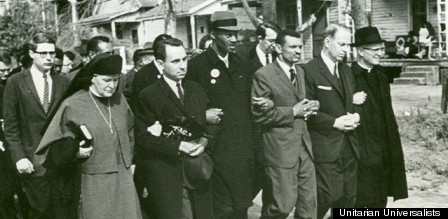
This week's roller coaster Supreme Court sessions have left many liberal religious people queasy -- that's certainly what it's done for us. Both of us are Unitarian Universalist ministers. One of us, a straight African-American woman, is a parish minister in New York City. The other is a lesbian white woman who ministers from Minneapolis. Both of us are allies in the larger struggle for justice in a profoundly unjust world. Today, we find ourselves needing to speak with one voice, refusing to be divided as we are both uplifted and outraged. We have been searching for adequate responses from our communities of birth and choice and finding them lacking.
The court's ruling to throw out Section Four(b) of the Voting Rights Act of 1965 is an especially bitter blow, and not only because of its effect as a frontal assault on our democratic process. Our association of congregations has long championed the right of every American to vote, has participated in every major effort to secure that right, and has lost both clergy and laity in that effort: Viola Liuzzo, murdered in Mississippi in 1965, and the Rev. James Reeb, murdered in Selma, Alabama in 1965, were among the Unitarian Universalists who joined with others -- religious and non-religious -- to secure the blessings of liberty for every citizen during those terrible years. The actions of the Supreme Court this week make a mockery of those who fought and died in this epic struggle, and prove that our work is not yet done.

Wednesday's ruling against the Defense of Marriage Act was a stark and welcome contrast, as the Court embraced one of our nation's core concepts: equal justice under the law. Our faith community has labored long and hard for the rights of LGBTQI people, particularly for their right to marry. We established an office of gay and lesbian concerns in 1970, one year after Stonewall, one of the first faith voices to speak out loudly for lbgt equality. Our ministers began providing union services for same-sex couples as early as the 1950s, and our national movement spoke out with a statement on legal marriage equality in 1996. Unitarian Universalists have been plaintiffs, lawyers and street activists in every state struggle. Indeed, today Ugandan Unitarian Universalists carry on this struggle even in the face of death threats.
Yet the uneven and muted responses from leadership in the LGBT community in response to the dismantling of the Voting Rights Act, as well as tepid congratulations from leaders of People of Color groups, has made this week of both great loss and great progress end with us feeling we are at a stalemate. It's painful to note how few LGBTQI groups joined in the amicus briefs filed in support of Shelby v. Holder, the voting rights case; it's just as painful to see how few People of Color groups joined in the amicus briefs for Windsor v. US. Lukewarm responses like these serve to discourage the coalition building that is crucial to justice in our common lives. Not all LGBTQI people are white or male; not all endangered voters are black or Hispanic or heterosexual. Our reluctance to make common cause hinders our effectiveness at the very moment in our history when it is most necessary.
Limited victories, crushing losses -- none of them are permanent. So long as we remain in our separate silos, we will always be vulnerable to a change in mood, a change in party or a shift in the polls. Once we really understand, believe and are willing to act based on the interconnectedness of our lives, we will stop issuing pro-forma joint statements of regret, as LGBTQI groups did on Tuesday and begin envisioning the urgent activism that is necessary. Once we know that our real power lies in coalition building for justice, we will not step away from the celebration of our LGBTQI sisters and brothers, as some civil rights groups did on Wednesday. We will learn to trust one another and learn to honor one another's gains and losses. We will begin to understand the ways that each of us has been both marginalized and privileged within American society -- and we won't fall in love with either position. We will learn not to be played by anyone with a vested interest in keeping us at odds with one another, because we will be clear about one thing: justice is justice.
June is a rich month of commemoration and coalition. June marks the 49th anniversary of the murders of Freedom Riders Michael Schwerner, Andrew Goodman and James Cheney; June marks the 46th anniversary of the Loving v. Virginia Supreme Court case that invalidated laws prohibiting interracial marriage; yesterday, June 28, is the 44th anniversary of the Stonewall Rebellion that sparked what became the modern-day LGBTQI movement. In this month of converging struggles for justice, may each one of us recommit ourselves to the justice for every human being.